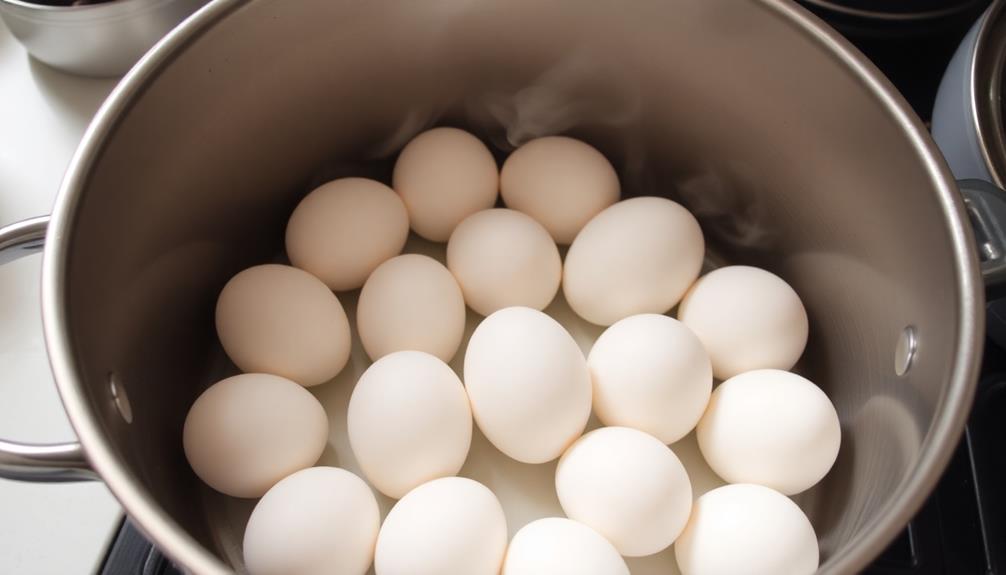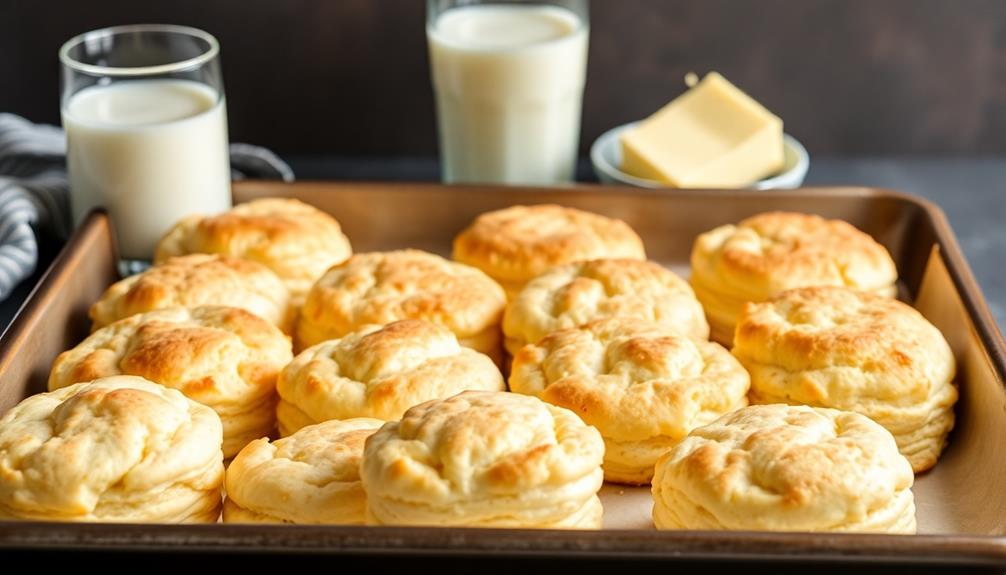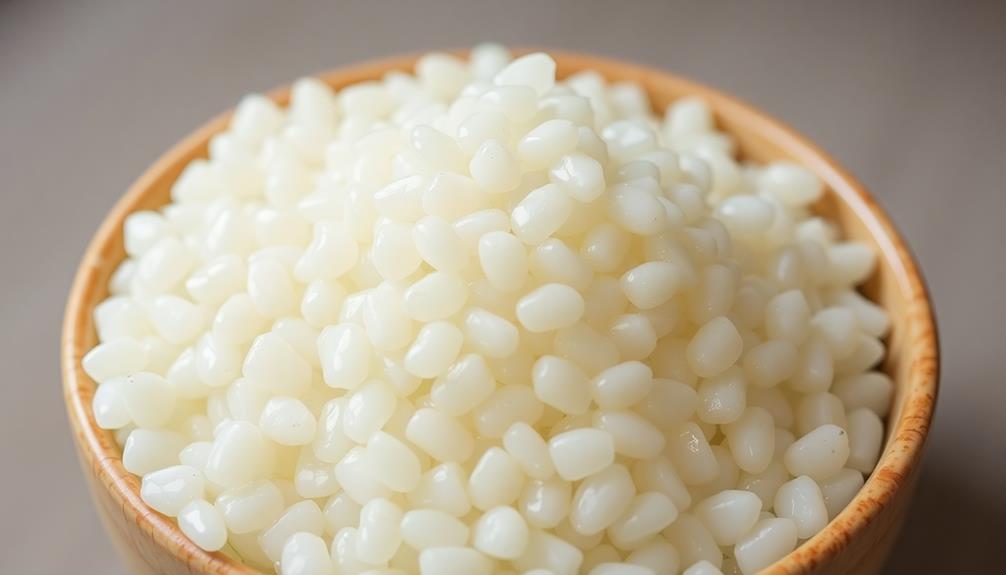Want to make perfect hard-boiled eggs every time? It's easier than you might think! Start by placing the eggs in a single layer in a saucepan, then cover them with cold water. Bring the water to a gentle boil, avoiding high heat which can lead to a rubbery texture. Remove from heat, drain the hot water, and let the eggs stand for 12 minutes before transferring them to an ice bath. This simple process ensures consistently easy-to-peel hard-boiled eggs, whether you enjoy them as a protein-packed snack or use them in delicious recipes. Keep reading to master even more egg-cellent cooking tips!
Key Takeaways
- Use fresh, room temperature eggs for best results and easy peeling.
- Gently lower eggs into cold water, ensuring they are fully submerged.
- Bring water to a gentle boil and remove from heat, allowing eggs to sit for 12 minutes.
- Transfer eggs to an ice bath immediately after cooking for optimal texture and peelability.
- Adjust cooking time based on desired level of doneness, ranging from soft to hard-boiled.
History

Hard-boiled eggs have been a beloved culinary staple for centuries. The origins of this simple yet delicious dish can be traced back to ancient civilizations like China, Ancient Greece, and the Roman Empire. In these early cultures, hard-boiled eggs were often used in religious ceremonies and as a nutritious snack.
Over time, the preparation of hard-boiled eggs evolved, with different techniques and methods emerging in various regions. For example, in 18th century Europe, hard-boiled eggs were sometimes adorned with intricate designs and colored with natural dyes, becoming a popular Easter tradition.
Today, hard-boiled eggs remain a versatile and convenient food, enjoyed for breakfast, salads, snacks, and even as an ingredient in various recipes.
Whether you prefer them plain, seasoned, or transformed into deviled eggs, the humble hard-boiled egg continues to hold a special place in the hearts and kitchens of people around the world.
Recipe

Hard-boiled eggs are a versatile and nourishing ingredient that can be enjoyed on their own or incorporated into a variety of dishes.
Whether you're making deviled eggs, egg salad, or simply want a protein-packed snack, perfecting the art of hard-boiling eggs is an essential skill in the kitchen.
The key to achieving perfectly cooked hard-boiled eggs lies in the careful attention to the cooking process. By following a few simple steps, you can ensure that your eggs turn out with a tender, fully-cooked yolk and a smooth, easy-to-peel shell.
Ingredients:
- Eggs
- Water
Cooking Instructions:
Place the eggs in a single layer in a saucepan and cover with cold water by 1 inch. Bring the water to a boil over high heat.
Once the water reaches a rolling boil, remove the pan from the heat, cover, and let the eggs sit for 12 minutes.
Extra Tips:
After the 12-minute cooking time, immediately transfer the eggs to an ice bath to stop the cooking process. This will help the shells peel off easily.
For best results, let the eggs sit in the ice bath for at least 15 minutes before peeling. Peeling the eggs under running water can also make the process easier.
Cooking Steps

Place the eggs in a single layer in a saucepan.
Cover the eggs with water, then bring the pot to a gentle boil.
Once boiling, remove the pan from the heat and let the eggs stand for 12 minutes.
Step 1. Place Eggs in Single Layer

Next, carefully place the eggs in a single layer at the bottom of the saucepan. This ensures even cooking and prevents the eggs from bumping into each other, which could cause cracks or uneven results.
Arrange the eggs so they're not touching, giving each one enough space to cook properly. If you're making a larger batch, you may need to use multiple pans to keep the eggs in a single layer.
Once the eggs are in place, you're ready to move on to the next step: adding water.
Step 2. Cover Eggs With Water

With the eggs nestled in the pan, it's time to add water. Carefully pour in enough cold water to cover the eggs by about an inch. This extra water will help the eggs cook evenly and prevent cracking. Don't be shy – you want the eggs fully submerged.
Once the water is added, place the pan over high heat and bring it to a full, rolling boil. You'll know it's boiling when you see big, rapid bubbles breaking the surface. This step is crucial, as the boiling water will help cook the eggs to perfection.
After the water reaches a boil, reduce the heat to maintain a gentle simmer. Set a timer for the desired doneness, usually around 12 minutes for hard-boiled eggs.
Be patient and resist the urge to lift the lid, as this can disrupt the cooking process. With the water simmering steadily, your eggs will turn out flawless every time.
Step 3. Bring to a Gentle Boil

Bringing the water to a gentle boil is crucial for perfectly cooked hard-boiled eggs. Once the eggs are submerged in water, turn up the heat on your stove to medium-high. You'll want to see small bubbles gently rising to the surface – that's the sign of a gentle boil.
Resist the urge to crank the heat up high, as a rapid, rolling boil can cause the eggs to crack or become rubbery.
Take a moment to set a timer for the desired cooking time, usually around 12 minutes for large eggs. This ensures you don't overcook them.
While the eggs are simmering, you can prepare an ice bath nearby to quickly cool them down once the time is up. The gentle boil helps the eggs cook evenly all the way through, resulting in that perfect hard-boiled texture with a tender yolk.
Pay close attention, and you'll be on your way to hard-boiled egg perfection.
Step 4. Remove From Heat

Once the timer goes off, it's time to remove the eggs from the heat. Carefully take the pot off the burner and place it in the sink. Be cautious – the pot will be very hot!
Gently drain the hot water from the pot, keeping the eggs inside. This sudden change in temperature is what helps create the perfect hard-boiled texture.
Next, cover the eggs with cold water. This rapidly cools them down, stopping the cooking process. Let the eggs sit for 5-10 minutes, allowing them to fully chill. The cold water helps the shells peel off more easily later on.
After the eggs have cooled, you can drain the water and get ready for the final step – peeling! Take each egg and gently tap it against a hard surface to crack the shell. Peel off the shell, revealing your perfectly cooked hard-boiled egg.
With these simple steps, you'll have delicious, easy-to-peel hard-boiled eggs every single time.
Step 5. Let Stand for 12 Minutes

After carefully removing the pot from the heat, let the eggs stand for 12 minutes. This crucial step allows the eggs to finish cooking through the residual heat. During this time, the whites will firm up, and the yolks will set to your desired level of doneness.
Don't be tempted to rush this process – patience is key for achieving perfectly cooked hard-boiled eggs.
Once the 12 minutes are up, you can immediately transfer the eggs to a bowl of ice water. This rapid cooling stops the cooking and makes the eggs easier to peel.
Let them sit in the ice bath for at least 5 minutes before attempting to remove the shells.
The standing time is essential for ensuring your hard-boiled eggs turn out flawless every single time. Follow this step closely, and you'll be rewarded with a batch of beautifully cooked eggs, ready to enjoy as a snack, in salads, or as part of your favorite recipes.
Final Thoughts

Ultimately, perfecting the art of hard-boiled eggs is a simple yet rewarding endeavor.
You've mastered the timing and technique – now it's time to get creative! Why not experiment with different cooking methods, like steaming or baking the eggs? You could also try flavoring the water with herbs, spices, or even citrus for a unique twist.
And don't forget about the endless possibilities for serving hard-boiled eggs. They make a great protein-packed snack, salad topper, or ingredient in sandwiches and deviled eggs.
With a little practice, you'll be whipping up perfectly cooked eggs every time. The key is to stay patient and have fun with the process. Who knows, you might even discover your new favorite breakfast or lunch staple.
Frequently Asked Questions
How Long Do Hard-Boiled Eggs Last in the Refrigerator?
Hard-boiled eggs can last in the fridge for up to one week. Store them in their shells, and they'll stay fresh longer. Just be sure to keep them refrigerated at all times.
Can I Use Any Type of Egg for Hard-Boiling?
You can use any type of egg for hard-boiling, but the results may vary. Farm-fresh eggs or store-bought eggs can both be hard-boiled, though older eggs may be easier to peel.
Is There an Easy Way to Peel Hard-Boiled Eggs?
Sure, there's an easy way to peel hard-boiled eggs. Start by gently tapping the egg on the counter to crack the shell. Then, peel off the shell, running your fingers under the water to help it slide off easily.
Can I Reheat Hard-Boiled Eggs?
Yes, you can reheat hard-boiled eggs. Simply place them in a bowl of hot water for a few minutes until they're warmed through. Just be careful not to let them cook too long, or they'll become rubbery.
What Are the Health Benefits of Hard-Boiled Eggs?
Hard-boiled eggs are a nutritious snack that provide you with high-quality protein, essential vitamins, and minerals. They can help you feel fuller for longer, support muscle recovery, and enhance brain function.










